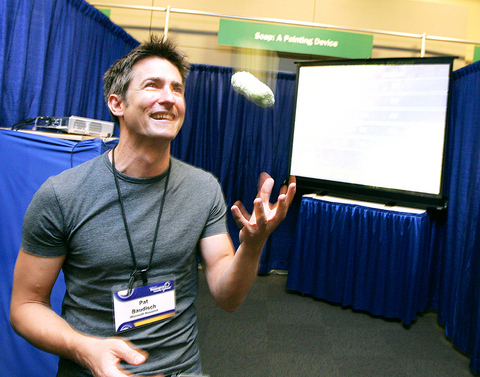Microsoft Corp said it is building a music player to challenge Apple Computer Inc's iPod, confirming months of speculation that the world's largest software maker was preparing to enter the US$4 billion market.
The first products go on sale this year and are being developed under the code name Zune, Redmond, Washington-based Microsoft said in an e-mailed statement yesterday from General Manager Chris Stephenson. A service will rival Apple's iTunes.
Microsoft is aiming to dent Apple's 77 percent share of the US market for digital music players with a product that will offer the Wi-Fi wireless Internet connection the iPod lacks. Apple's popularity among consumers and deep catalog of content make it an uphill climb.

PHOTO: AP
"It will take an awful lot for Microsoft to dislodge an entrenched competitor like Apple," said Michael Gartenberg, an analyst with Jupiter Research in New York.
"Given Apple's history with iPod, it's not like they're going to sit back while Microsoft enters the market," he said.
Microsoft's statement, sent by spokeswoman Sally Julien, provided no additional description of the products. Julien declined to comment further or to make a Microsoft official available. Apple said it had no comment, according to spokeswoman Natalie Kerris.
The Wi-Fi connection will let users share some content between devices, said Jeff Kempler, executive vice president of Virgin Records America, a label owned by London-based EMI Group Plc, in an interview. Kempler saw a slide show about the device and hasn't seen a demonstration.
"Wi-Fi capability is incredibly positive," said George White, a senior vice president at New York-based Warner Music Group, said in an interview.
"It's something we've always wanted to see -- ways to legally share music to get people to purchase it," he said.
White met with Microsoft three weeks ago to discuss licensing Warner's music.
Virgin has been in "productive conversations" with Microsoft about licensing its music and has talked with the company about making artists available to promote and advertise the device, Kempler said.
Microsoft is planning a large marketing campaign, comparable in size to the US$500 million spent to release the Xbox 360 video game console last year, Billboard magazine wrote, citing an interview with Microsoft's Stephenson.
Microsoft is abandoning a six-year strategy of relying on partners who build devices based on Microsoft's Windows Media software. None of the partners, including Sandisk Corp, Creative Technology Ltd, Toshiba Corp, Samsung Electronics Co, Napster Inc and RealNetworks Inc, have even a 10 percent share of the market.

With an approval rating of just two percent, Peruvian President Dina Boluarte might be the world’s most unpopular leader, according to pollsters. Protests greeted her rise to power 29 months ago, and have marked her entire term — joined by assorted scandals, investigations, controversies and a surge in gang violence. The 63-year-old is the target of a dozen probes, including for her alleged failure to declare gifts of luxury jewels and watches, a scandal inevitably dubbed “Rolexgate.” She is also under the microscope for a two-week undeclared absence for nose surgery — which she insists was medical, not cosmetic — and is

GROWING CONCERN: Some senior Trump administration officials opposed the UAE expansion over fears that another TSMC project could jeopardize its US investment Taiwan Semiconductor Manufacturing Co (TSMC, 台積電) is evaluating building an advanced production facility in the United Arab Emirates (UAE) and has discussed the possibility with officials in US President Donald Trump’s administration, people familiar with the matter said, in a potentially major bet on the Middle East that would only come to fruition with Washington’s approval. The company has had multiple meetings in the past few months with US Special Envoy to the Middle East Steve Witkoff and officials from MGX, an influential investment vehicle overseen by the UAE president’s brother, the people said. The conversations are a continuation of talks that

CAUTIOUS RECOVERY: While the manufacturing sector returned to growth amid the US-China trade truce, firms remain wary as uncertainty clouds the outlook, the CIER said The local manufacturing sector returned to expansion last month, as the official purchasing managers’ index (PMI) rose 2.1 points to 51.0, driven by a temporary easing in US-China trade tensions, the Chung-Hua Institution for Economic Research (CIER, 中華經濟研究院) said yesterday. The PMI gauges the health of the manufacturing industry, with readings above 50 indicating expansion and those below 50 signaling contraction. “Firms are not as pessimistic as they were in April, but they remain far from optimistic,” CIER president Lien Hsien-ming (連賢明) said at a news conference. The full impact of US tariff decisions is unlikely to become clear until later this month

Nintendo Co hopes to match the runaway success of the Switch when its leveled-up new console hits shelves on Thursday, with strong early sales expected despite the gadget’s high price. Featuring a bigger screen and more processing power, the Switch 2 is an upgrade to its predecessor, which has sold 152 million units since launching in 2017 — making it the third-best-selling video game console of all time. However, despite buzz among fans and robust demand for pre-orders, headwinds for Nintendo include uncertainty over US trade tariffs and whether enough people are willing to shell out. The Switch 2 “is priced relatively high”